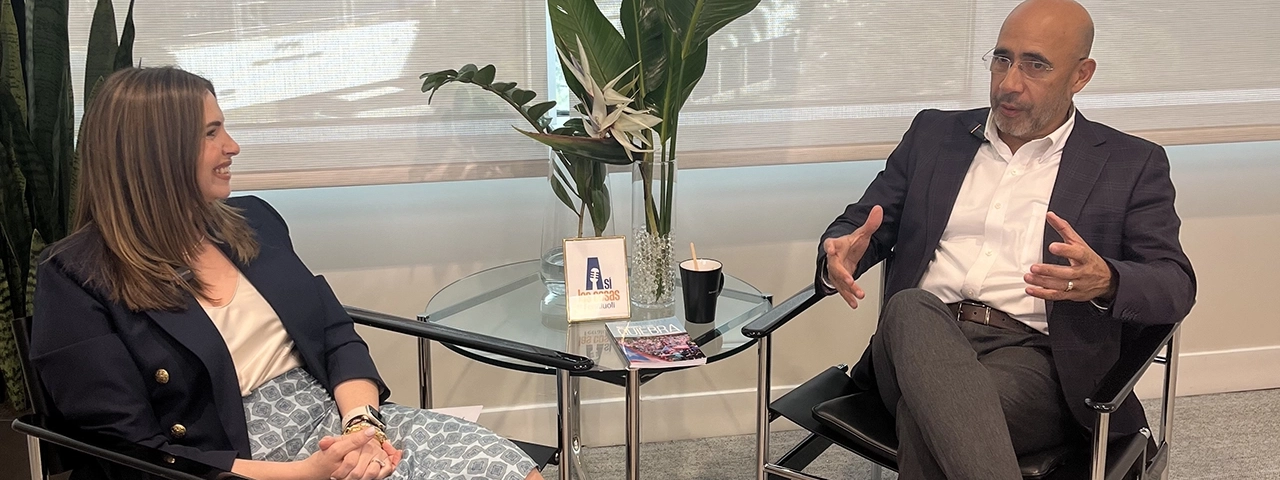In the fifth episode of Así Las Cosas by Ferraiuoli, hosted by Maristella Collazo-Soto, Capital Member and Co-Chair of the Intellectual Property Practice Group, engages in a thought-provoking discussion with Gustavo Vélez, renowned Puerto Rican economist and founder of Intelligent Economics. Together, they explore Puerto Rico’s economic background, its challenges, and the opportunities that lie ahead for the island’s sustainable growth.
For years, Puerto Rico has faced economic volatility—navigating a fiscal crisis, natural disasters, and global disruptions like the COVID-19 pandemic. While federal aid has provided short-term relief, Vélez raises a critical question: Is Puerto Rico’s economy truly recovering, or are we merely experiencing an artificial sense of progress?
Gustavo Vélez: A Multifaceted Journey in Economics
Gustavo Vélez’s journey is anything but conventional. From starting his academic path as a student-athlete to discovering his passion for economics at the University of Puerto Rico, his career spans over two decades of public service and private consulting. Vélez’s unique experience in government roles—ranging from local municipalities to the Puerto Rican legislature—equipped him with a rich perspective on the island’s economic systems.
Puerto Rico’s Economic Realities
Vélez emphasizes that while the influx of federal funds has created a sense of economic improvement, the island remains reliant on external financial support, with federal aid constituting 35% of its economy.
This artificial stability, Vélez notes, underscores the urgent need for Puerto Rico to build self-sustaining industries. He identifies sectors such as tourism, remote services, and technology as key opportunities, citing the island’s natural advantages and bilingual workforce as assets.
Vélez points to sectors with natural competitive advantages, including:
- Tourism & Hospitality – Leveraging Puerto Rico’s natural beauty and cultural heritage to build a robust, incentive-free tourism industry.
- Technology & Innovation – Developing a thriving tech ecosystem that capitalizes on the island’s bilingual, highly skilled workforce.
- Professional Services & Exports – Expanding the export of legal, financial, and consulting services to Latin America and beyond.
These industries, when properly cultivated, can create long-term economic stability by fostering job creation, attracting investment, and enhancing Puerto Rico’s global competitiveness.
The Role of Government in Economic Development
A recurring theme in the discussion is the government’s role in either facilitating or hindering economic growth. Vélez argues that Puerto Rico needs a strategic, long-term economic plan that aligns federal resources, local policies, and private sector initiatives to foster a self-sustaining economy.
Key areas where government intervention is essential include:
- Regulatory and Permitting Reforms – Streamlining bureaucratic processes to facilitate business growth.
- Energy Infrastructure – Ensuring stable and affordable electricity to support industry and innovation.
- Tax and Incentive Structures – Creating a predictable and competitive tax framework that attracts investment.
Vélez calls for a shift in government philosophy—from being a dominant economic player to acting as an agile facilitator that enables the private sector to thrive.
Leadership Lessons and Economic Vision
As an entrepreneur himself, Vélez shares actionable advice. He encourages businesses to adapt to a new normal post-pandemic, focus on maximizing profit margins in the face of rising operational costs, and invest in human resources to foster loyalty and productivity.
With federal relief funds eventually tapering off, businesses must proactively adapt to a shifting economic environment. Vélez offers three key recommendations for entrepreneurs and business leaders:
- Understand the Economic Transition – Companies should be aware that the economy is normalizing post-pandemic, requiring a shift from reliance on government support to self-sustaining operations.
- Maximize Financial Efficiency – Rising costs in wages, utilities, and insurance make financial discipline essential. Businesses should focus on optimizing operations and increasing profitability.
- Invest in Talent Retention – Retaining skilled employees is becoming more challenging. Companies must prioritize workforce engagement and productivity to remain competitive in a tightening labor market.
Why You Should Tune In
This episode of Así Las Cosas is a must-watch for entrepreneurs, policymakers, and professionals seeking to better understand Puerto Rico’s economic challenges and opportunities.
Watch the full episode on YouTube
At Ferraiuoli, we believe in fostering conversations that drive real change. As a firm committed to empowering businesses, entrepreneurs, and industry leaders, we remain dedicated to helping our clients with strategic legal guidance and business-forward solutions.






